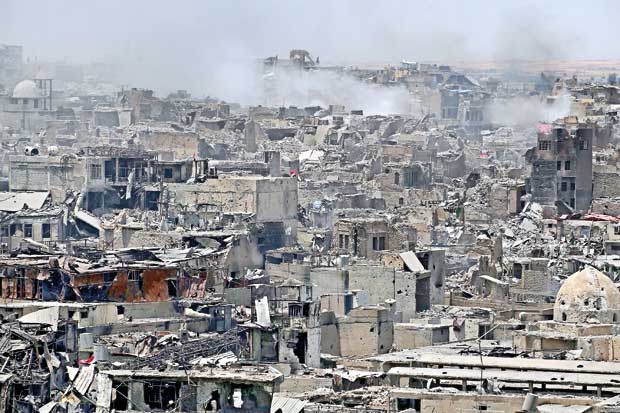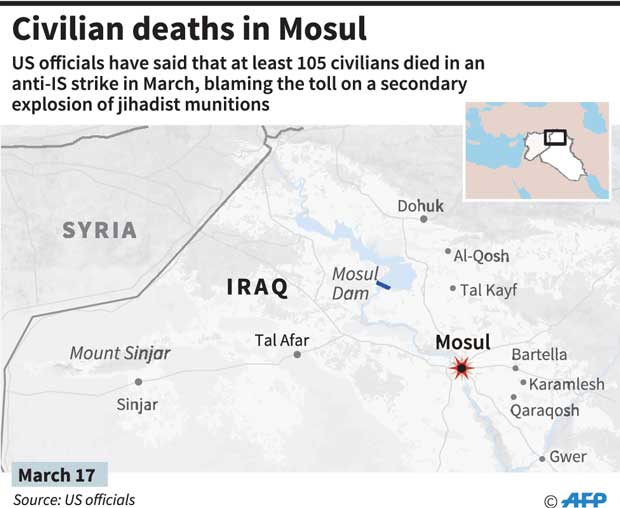14 Jul 2017 - {{hitsCtrl.values.hits}}
 A picture taken this week shows a general view of the destruction in Mosul’s Old City. AFP
A picture taken this week shows a general view of the destruction in Mosul’s Old City. AFP
Iraq’s victory over ISIS in Mosul is not the end of the road for the most ruthless terror group. Neither does it herald the beginning of a peaceful era in the land trod by prophets and peacemakers.
The troubles are far from over, with little or no effort being made to address their root causes. In all likelihood, the next powder keg is Kurdistan.
In many other regions of the world, periods of war follow periods of peace, but not so in the Middle East, birthplace of the world’s three main religions. Its soil has, perhaps, absorbed more blood than rainwater for the past several millennia. Are the people incapable of living in peace? Or, is war a way of life in the region? Nay, the people are the disposables in the political power games their rulers play in collusion with the West.
 Be it the creation of Israel in 1947, the present ISIS terrorism or, the war on impoverished Yemen, the troubles have their origins in decisions made in London and Washington, and of late, in Riyadh and Tel Aviv.
Be it the creation of Israel in 1947, the present ISIS terrorism or, the war on impoverished Yemen, the troubles have their origins in decisions made in London and Washington, and of late, in Riyadh and Tel Aviv.
Who created ISIS or the so-called Islamic State in Iraq and Syria? ISIS is a dangerous byproduct of the 2003 US invasion of Iraq. The blunders the West and the region’s arrogant rulers made created the breeding grounds for radicalism. Muslim youth are radicalised easily because they are angry. They are angry because, all they see around them is institutionalised injustice, for which they hold their corrupt rulers and the West responsible.
Global aid agency Mercy Corp, in a 2015 research report, said that more than poverty and unemployment, it’s the experience of injustice, discrimination and marginalisation, coupled with exposure to corruption, humiliation and violence, that triggered the decision for many to join radical groups. It is dignity, not dollars, the angry youth are after.

But the angry youth often become easy prey to manipulative mullahs, who, in turn, are handled by the big powers through their intelligence agencies. Terror leaders cite Quranic verses out of context and sayings falsely attributed to Prophet Muhammad to make terrorism alluring to the youth. Terrorism, if handled diligently, is an instrument used by certain big powers to achieve national interest goals. In hindsight, the origin of ISIS and the role it played in political events of the region appear that the group was part of a grand project aimed at Balkanising the region, beginning with a regime change in Syria. The divide-and-rule principle at play.
ISIS leader Abu Bakr al-Baghdadi, who is now confirmed dead, came into the scene from nowhere. He was taken to an American-run prison in Iraq as a ‘civilian detainee’ and allowed to make contacts with hardcore Islamists held there. This happened while the Arab Spring was sweeping the region in 2011.
Once released, he revived the Al-Qaeda in Iraq (AQI) which had become defunct after the death of Abu Musab al-Zarqawi.
Baghdadi’s popularity rose among Iraq’s Sunnis, after he successfully led a jailbreak in 2011 in Iraq, and freed some 3,000 Sunnis arrested on charges of terrorism. Adding credence to the claims that ISIS works for foreign powers, the freed Sunni prisoners were moved to Syria. A Hillary Clinton email published by WikiLeaks last year, had this to say: “… we need to use our diplomatic and more traditional intelligence assets to bring pressure on the governments of Qatar and Saudi Arabia, which are providing clandestine financial and logistic support to ISIL and other radical Sunni groups in the region.”
It is worthwhile to mention here that the Taliban which captured power in Afghanistan in 1996, was created by Pakistan’s Inter-Service Intelligence and supported by the Americans, the Saudis and the Emiratis.
The astonishing military success ISIS made in Syria, helped the group grow in confidence. It became a runaway terrorist outfit that took only money and weapons from its handlers, but not orders. It even severed all links with al-Qaeda’s leadership and fought al-Qaeda’s Syrian franchise Jabhat al Nusra.
While its handlers pondered how to deal with it, the terror group captured large parts of Iraq’s Sunni areas, including key cities such as Tikrit, Ramadi, Fallujah and Mosul. These victories made angry Sunni youths worldwide see ISIS as the promised liberator mentioned in the Prophet’s sayings. Across the globe, terror groups operating with Islamic labels pledged allegiance to ISIS.
With ISIS influence spread across the world, it is too early to say the demise of Baghdadi and the defeat in Mosul will sound the death knell for ISIS. As long as institutionalised injustice remains, terror groups will not face a shortage of recruits. It is in this context that the Iraqi government needs to redouble its efforts to woo its Sunni population. They are angry.
The Iraqi government’s victory became possible only after a brutal siege was laid to Mosul. There is virtually, not a single building that is standing, following nine-months of relentless airstrikes and artillery fire by Iraqi and US forces. The scenes of destruction can perhaps be comparable only to the kind of devastation the Allies brought upon Tokyo during World War II.
Now that the ISIS is virtually dead in Iraq and breathing its last in Syria, what’s next? Certainly, it is not peace. More conflicts are likely. Already, fears have been expressed about a military confrontation between the Kurds and Turkey. Even Iraq and Iran may be dragged into this conflict. The Kurds played a key role as a US ally in the defeat of ISIS in both Syria and Iraq. They are now set for major political manoeuvres. A referendum will be held on September 25 in the autonomous Kurdistan region in Iraq, to decide whether to go as a separate State. The outcome is a likely flashpoint in Iraq.
In Syria, the US is building a base in the Kurdish area, to be used as a backup facility, if Turkey decides to close down the NATO base in Incirlik. Already, Germany has begun withdrawing its troops from this base. A permanent NATO base in Syria is possible only if a Syrian Kurdish State emerges. Syria and its ally Russia will not agree to this. But the US has its own plans.
Despite US President Donald Trump’s boast about hands-on governance, the State Dept and the Pentagon do what they think is right. The Syrian ceasefire worked out last year by Russia and the Obama administration was scuttled by the Pentagon mandarins who were not happy about the truce.
Turkey, which is fighting its own Kurdish separatist insurrection, will not accept, without a fight, the emergence of independent Kurdish States on its borders. The two new Kurdish States, backed by the US and Israel, will also be a major security poser for Iran, a country with a minority Kurdish population.
Needless to say, the developments portend more bloodshed in a region where disputes are seldom settled peacefully.
29 Oct 2024 29 Oct 2024
29 Oct 2024 29 Oct 2024
29 Oct 2024 29 Oct 2024
29 Oct 2024 29 Oct 2024
29 Oct 2024 29 Oct 2024